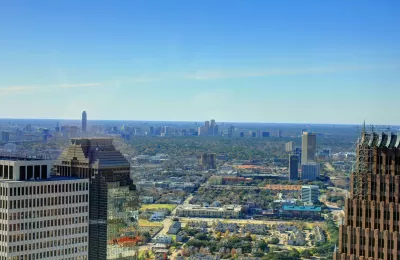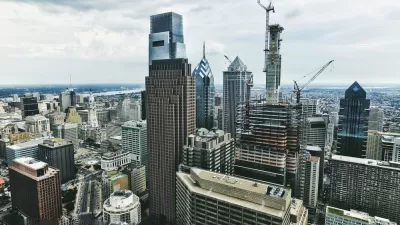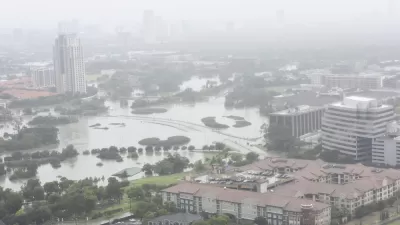The city's unabated growth has made it a bustling hub of industry and commerce, but can it sustain its unmitigated outward sprawl?

Dug Begley takes on Houston's "relentless expansion," arguing that the city's current slate of massive projects "is leaving local leaders straddled between past strategies and unproven alternatives, between more sprawl and urbanization."
Houston's choice, according to Begley, "is how fast it should embrace an end to the old way of doing things and abandon the strategy of additional fringe development that for decades fueled growth" as the region's population growth continues unabated. Critics say the city's outward expansion becomes increasingly unsustainable in the face of the growing threats of climate change and natural disasters. But others worry that reining in sprawl will also lead to a sharp rise in real estate prices and less affordable housing for local families.
"Historically, Houston always has said yes to bigger projects: Wider freeways, larger detention ponds, bigger water pipes." And while recent debates over projects such as the expansion of I-45 signal a shift in thinking, it may not be enough. "Currently, the Houston-Galveston Area Council — the local planning agency that doles out federal money — has projects to continue building the Grand Parkway around the metro region, widen or expand nearly every existing freeway and build a new highway through Brazoria and Fort Bend counties on its books, along with various transit and bicycling projects." Some local leaders, such as Houston Mayor Sylvester Turner, want more incentives for public transit funding built into the infrastructure bill. Turner "has called for a 'paradigm shift' in local transportation" and said "the infrastructure bill needs stronger provisions to encourage local officials to tee up projects that meet climate goals."
FULL STORY: Houston became 'the blob that ate East Texas' by building big. Is it time for that to change?

Planetizen Federal Action Tracker
A weekly monitor of how Trump’s orders and actions are impacting planners and planning in America.

Chicago’s Ghost Rails
Just beneath the surface of the modern city lie the remnants of its expansive early 20th-century streetcar system.

San Antonio and Austin are Fusing Into one Massive Megaregion
The region spanning the two central Texas cities is growing fast, posing challenges for local infrastructure and water supplies.

Since Zion's Shuttles Went Electric “The Smog is Gone”
Visitors to Zion National Park can enjoy the canyon via the nation’s first fully electric park shuttle system.

Trump Distributing DOT Safety Funds at 1/10 Rate of Biden
Funds for Safe Streets and other transportation safety and equity programs are being held up by administrative reviews and conflicts with the Trump administration’s priorities.

German Cities Subsidize Taxis for Women Amid Wave of Violence
Free or low-cost taxi rides can help women navigate cities more safely, but critics say the programs don't address the root causes of violence against women.
Urban Design for Planners 1: Software Tools
This six-course series explores essential urban design concepts using open source software and equips planners with the tools they need to participate fully in the urban design process.
Planning for Universal Design
Learn the tools for implementing Universal Design in planning regulations.
planning NEXT
Appalachian Highlands Housing Partners
Mpact (founded as Rail~Volution)
City of Camden Redevelopment Agency
City of Astoria
City of Portland
City of Laramie




























